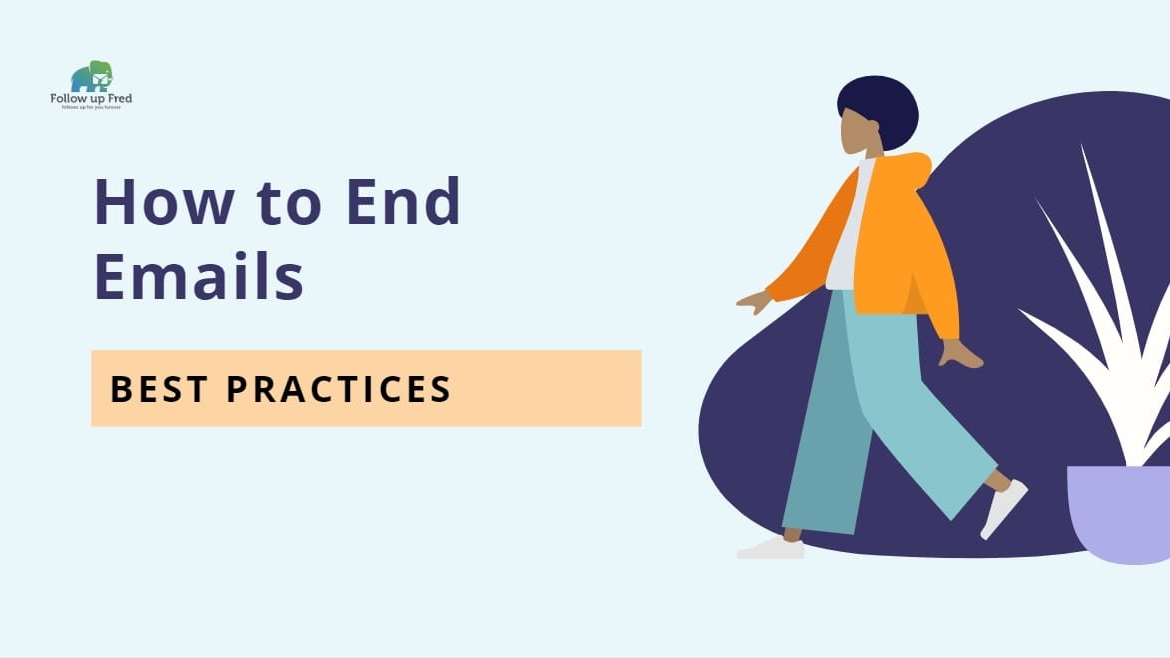There’s an art in how to sign off an e-mail; it’s a chance to wrap up the great impression you’ve made with the rest of your message. Great e-mail closings can leave a positive impression that reinforces the content you shared; a poor closing can leave a bad taste in the recipient’s mouth. Today, we’re going to discuss how to end an email in the automated follow-up email extension.
Whether you’re writing a sales email, a customer service message, or a call for donations or volunteer time, there’s a billion ways to close an email. Let’s go over the best email sign-offs and how to use them. We’ll even include some examples on how to end an email professionally, with varying tones to give you more ways to individualize your endings based on your rapport with the recipient. Not only will we show you how to end a formal email, but we’ll also show you some less formal (yet still professional) ways to do so.
Find the Correct Target for Your Emails
The tone is so important in emails; without the nonverbal cues that make face-to-face communication so much easier, your written ‘voice’ has to work double-time to reinforce your ideas and words.
It’s important to develop a natural, comfortable voice, but you’ve got to know your audience. An e-mail to the CEO of a major client might be more formal, whereas an email to your counterpart at another business might be more relaxed. If you haven’t met someone, you might choose more formality. An established rapport with someone might mean you use your closing to allude to a shared experience or joke or check-in about personal matters. Learning how to read the room is really important in electronic communication, and this can make you far more effective as an email maestro!
You’ve also got to consider your “brand voice” if you’re representing your company. Some companies expect very polite, formal replies that are strictly business. Others are more playful or humorous while still professional.
And, just as importantly, consider your subject matter. If you’re sending a sales email to existing customers, you might want a light and humorous tone. If you’re writing an email to inform a customer they need $20,000 worth of repairs to their roof, they’re less likely to appreciate your jokes.
Strong emails keep in mind all these factors, but there are exceptions to every one of these rules. Keep in mind that ending an email is as important as knowing how to start an email professionally. We recommend leaning toward the more formal style if you’re in doubt, but don’t be afraid to let your personality and humor shine through when you feel it right.
What Are the Best Practices When Ending an Email
Here are some overall best practices when ending an email. These are generally universally good ideas regardless of how you choose to close your message.
- Call To Action
It’s much harder for recipients to ignore your email when you end with a definitive call to action. Be definitive and specific in the next steps to take.- “I look forward to receiving your response by Tuesday.”
- “Please click the link and schedule your appointment to ensure your warranty doesn’t lapse.”
- “Check out this video tutorial on [product name] and let us know when we can set up a site visit to demonstrate how it will save you time…and money!”
- “I have reviewed your inquiry and will have a resolution to you by Monday at noon.”
- Consider how you want the recipient to feel after your email
Do you want them energized to act? Relaxed? Forgiving? The tone you set in your last sentence is much of what they’ll carry away after they close the email window.- Positive emails – Craft an uplifting final line, maybe with an exclamation point
- “Action needed” emails – Highlight or recap your Call To Action and needed next steps.
- Apologetic emails – Reiterate your apology and recap what you’re doing to fix the issue.
- Make sure you identify yourself clearly
Your email signature will help with this. However, since some email clients ‘hide’ signatures, you should still sign emails with your full name in the body of the e-mail. If you’re emailing someone you have a rapport with and who you email often, then using just your first name is often enough, but using your first and last name can help jog the recipient’s memory as to who you are if there’s not already a solid rapport. We’ll go over some good rules of thumb for signatures below.
Use an Appropriate Sign-off
Stan Lee, the founder of Marvel Comics, always signed correspondence with a single word: excelsior! It was unconventional, but it was a key part of his personal brand. In formal emails, you’re best sticking with the basics, such as ‘regards’ or ‘sincerely’. For other emails, a unique but on-brand sign-off can become a memorable part of your personal brand, just like Stan.
- Formal sign-offs
- Sincerely,
- Regards,
- Best Regards,
- With gratitude,
- Gratefully,
- Respectfully,
- Thanks for your consideration,
- At your service,
- All the best,
- Less formal
- Best,
- Warmly,
- Many thanks,
- Much appreciated,
- Cordially,
- With anticipation,
- Happy to help,
- Thanks in advance,
- Informal
- Cheers!
- Ciao,
- Take care,
- Enjoy your day,
- Thanks a million,
- Thanks so much,
- Hope this helps,
- Peace,
- Keep in touch,
- Pleasure working with you,
- Rock on,
- Keep being awesome,
- Stay tuned,
- You’re a lifesaver,
- I owe you,
- Carpe Diem,
- Adios!
- Mahalo,
- Musical theatre lovers
- Your Obedient Servant
Use an Appropriate Signature
A good signature gives the recipient additional information about you that may or may not be redundant or not fit into your email. However, you don’t want to overload it with too much info. Your professional email signature should include
- Name
- Job Title
- Company Name
- Contact info:
- Phone number
- Business address
- Website
Additional items you may include where applicable, bearing brevity in mind:
- Social media links
- Professional Facebook page
- Company blog
- Company logo (when including images in a signature, though, make sure they are sized appropriately or it overwhelms the rest of the signature!)
- Professional organizations you’re a member of
- Former fraternities or alumni info (generally not for corporate email accounts, but useful for entrepreneurs/freelancers)
- Upcoming events
- Personal motivational quotes
- A professional headshot photo
14 Ways to Close Emails with Examples
Here’s a selection of examples for various use cases:
After a Meeting or Interview
Thanks for taking the time to meet with me. I look forward to hearing from you soon.
Sincerely,
[your full name]
When scheduling an appointment
I look forward to our meeting on Monday the 19th at 230pm!
All the best,
[your full name]
Email to a Vendor with Established Rapport
I’ll get those invoices over to you right away, and I look forward to your proposal by Friday.
Thanks,
[your first name]
Trying to Schedule a Sales Meeting
Just let us know what time works best for your team and we’ll be happy to demonstrate how we can exceed your expectations,
All the best,
[your full name]
Customer Service Email About a Repair
We can order parts to complete your repairs as soon as you let us know the estimate is acceptable for you, so give us a call anytime before 6 pm today.
Thank you,
[your full name]
Email to a Client About an Order
If you’ll get me the dimensions for the area you need deep-cleaned by two pm, I can get you an estimate back today.
Thanks,
[your full name]
Professional Thank You Letter To Collaborating Partner
You were a genuine pleasure to work with and I’d be happy to share a positive testimonial on your LinkedIn or website if you’re interested; I appreciate the hard work you put into our project.
With gratitude,
[Your full name]
Reference Letter
If there’s any other information I can provide on [person receiving reference]’s candidacy for this position, don’t hesitate to reach out by phone, e-mail, or carrier pigeon.
Sincerely,
[Your full name]
Letter Asking for a Positive Review
I really appreciate your business with our dealership and please, once again, don’t forget to leave me a 5-star review on the customer survey you’ll be receiving in a few days!
Warmly,
[Your full name]
Sales Consultant
Resignation Letter
I have truly enjoyed my six years working with [company/organization name] and if there’s anything I can do to help make the transition easier, I’d be honored to assist.
Regards,
[Your full name]
Networking Letter
I can’t emphasize enough how grateful I’d be for the introduction to [person’s name], as it would make my application process to his company so much easier. Thanks in advance for your assistance.
Thanks,
[Your full name]
Thank You Letter
I can’t thank you enough for your guidance and advice during the project last month, and I hope to have the opportunity to return the favor or pay it forward in the future.
Cheers!
[Your first name]
Recommendation Letter
In short, [name of person being recommended] was not only an outstanding asset to my company during her tenure here, but a true example of kindness and respect to her co-workers and our clients. It was an honor to have her on our team for the time she spent here.
Regards,
[Your full name]
Vendor Complaint Letter
I expect a resolution on this matter by close of business Friday; keep me informed on your efforts to resolve the situation as soon as there are any changes.
In anticipation,
[Your full name]
Conference Speaker Invitation Letter
Please let me know by June 12th if you’d like to accept our invitation to be the keynote speaker at our conference, and be sure to let us know if you’d rather have us make your travel arrangements or have us reimburse you for your expenses!
Respectfully,
[Your full name]
Email closing is a great opportunity to reinforce your content and message one last time. By the same token, an unprofessional email closing can undo all the effort you put into the main part of your email and leave a poor impression on the recipient.
Thanks for reading and keep an eye out here for more great articles on writing effective emails!


